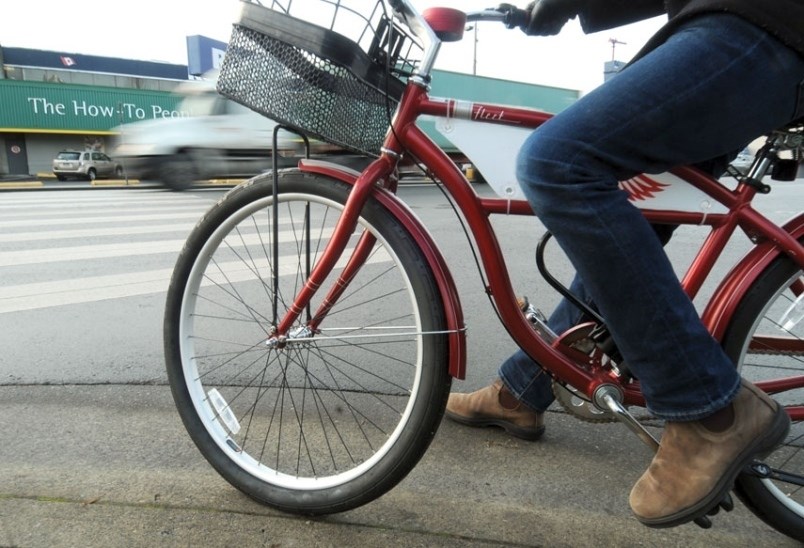This story has been amended to correct an error in the description of the upper Lynn Valley Road bike lane project.
The District of North Vancouver is squeezing the brakes on some bike lane projects while picking up downhill momentum on others.
According to a staff update to district council Monday afternoon (June 28), 12 active transportation infrastructure projects are going ahead in 2021 but seven others that were supposed to start this year have been put on hold.
Some of the delays are so the projects can be better lined up with other work planned by the Ministry of Transportation and Infrastructure or the City of North Vancouver or District of West Vancouver. In some other instances, it’s to give more time for district staff to do community engagement where they expect the work to include a difficult trade-off with on-street parking. Staff say they will not attempt to take on more than two of those projects per year.
That’s the case with plans for upper Lynn Valley Road between Hoskins and Dempsey roads, which will now be getting a short-term pilot project to make the road one-way northbound for vehicular traffic (along with making the first block of Dempsey one-way westbound) to allow for a two-way protected bike lane while maintaining most on-street parking.
Improvements to Deep Cove's infrastructure are being fast-tracked thanks, in part, to a recently approved rehabilitation project for Gallant Avenue.
The project to extend the district’s portion of the Spirit Trail all the way to Deep Cove is expected to take another nine years.
The update from staff triggered a debate familiar to anyone who has seen a North American municipal council discuss bike lanes in the modern era.
Coun. Megan Curren noted, on a day of record-breaking heat, that the district’s official community plan has a goal of having 35 per cent of all trips made via active transportation by 2030 and a unanimous agreement by council to reduce the community’s carbon emissions by 45 per cent by that same time.
“I'm just not seeing the level of urgency and a climate emergency response to this,” she said, adding that project should be prioritized based on their ability to achieve those goals. “We've built transportation systems that aren't compatible with human health or environmental health, and we rapidly need to change those. And we have a society that's addicted to cars and we prioritize convenience over health.”
Coun. Betty Forbes said she was in favour of bike lanes but she cautioned council not to expect the kind of active transportation infrastructure the City of Vancouver now installs.
“[Vancouver] can widen the sidewalks, they can put in the bike lanes and they still have ample space for cars. North Vancouver wasn't built that way. Some of our streets have no sidewalks and by the time you put in a sidewalk, there's certainly going to be no room for a bike lane,” she said.
Coun. Jim Hanson, however, said he too favoured increasing resources and shortening timelines for cycling infrastructure.
“I do believe in the age of electric bikes that an efficient, well-planned and well-constructed cycling network could really make a big difference,” he said, noting proper cycling lanes in his own neighbourhood of Seymour would “really open up a new way of life for us.”
Mayor Mike Little expressed doubt a bike lane would woo great numbers of people out of their vehicles, especially for longer commutes or nasty weather ones.
“We have to be strategic with the limited resources we have. Active transportation is a bunch of things. It's improving our pedestrian connections or cycling connections but also our bus connections,” he said.
Coun. Mathew Bond, however, urged council to consider the alternative.
“I don't think it's overly ambitious. It might cost money. It might cost a lot of money, but it's certainly less expensive than the status quo should we continue along the path that we're on,” he said.
A previous version of this story incorrectly stated Lynn Valley Road would be getting a one-way northbound bike lane. It is, in fact, motor vehicle traffic that will be reduced to one-way northbound.



